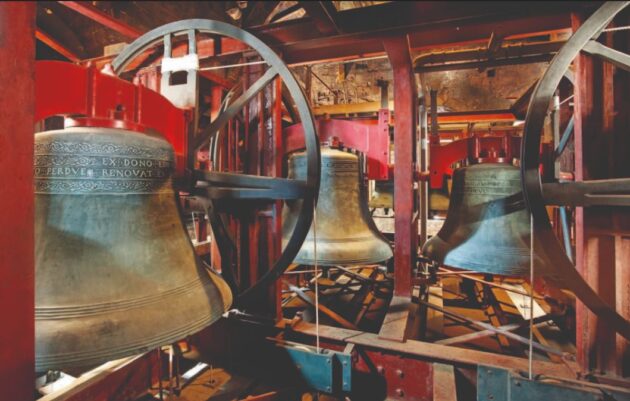Gerry
Ringing the Changes
Lit: to continuously alter or change something
When the year 2020 was about to end we rang the changes for the new year. At first glance, the meaning of this seems obvious – in the past, church bells were often rung not only to summon the faithful but also to celebrate some great victory or event. The crowning of a monarch, the end of a war. However, there is a bit more to ringing the changes than is obvious at first sight (or hearing perhaps).
Today we tend to use this phrase as a shorthand way of announcing, e.g. “They’re ringing the changes in government” when perhaps a cabinet is being changed to meet a leader’s whim. The phrase goes back a very long way and derives from the predominantly English art of change ringing where church bells were run in a complex sequence to create a ‘peal’ or as many changes as were possible depending on the number of bells to be rung.

Six bells could produce 720 different variations and bell ringers at adjoining parishes would compete to see who could maintain a peal or chant without error. Some Cathedrals had bell towers with eight or even sixteen bells and to hear the elaborate peal of a grandsire cinque being rung on eleven bells is memorable and uplifting—‘Closer indeed my God to Thee’.
Christine Ammur’s Dictionary of Clichés suggests that the term entered its more common usage in the 17th Century such as in Thomas Adams’s Devil’s Banket (1614) “Some doth ring the changes of opinions” and by the late 18th Century we find the term used for a swindle when an inferior object was substituted for a superior one. The reference is now obsolete but, as anyone knows, the behaviour is still common; ask anyone who has purchased an item on the internet only to find it not as elaborate as the one ordered. The ‘change had been rung’ on the unsuspecting buyer.
There are countless variations on the theme, for example, to chop and change and set alarm bells ringing still implying the bells of change or concern. We also talk of something having a ‘ring of truth’ which arose from the habit of tapping a coin on its edge to test its sound when coins were made of precious metals and had a particular sound that distinguished them from imitations. In 1850 Frederick Robinson used the expression in one of his sermons, “Truth so to speak, has a certain ring by which it is known.”
Perhaps the bells of change on the 31st December 2020 announced a New Year that by any stretch of the imagination must surely be an improvement on our previous annus horribilis.
Please share this BFD article so others can discover The BFD.

